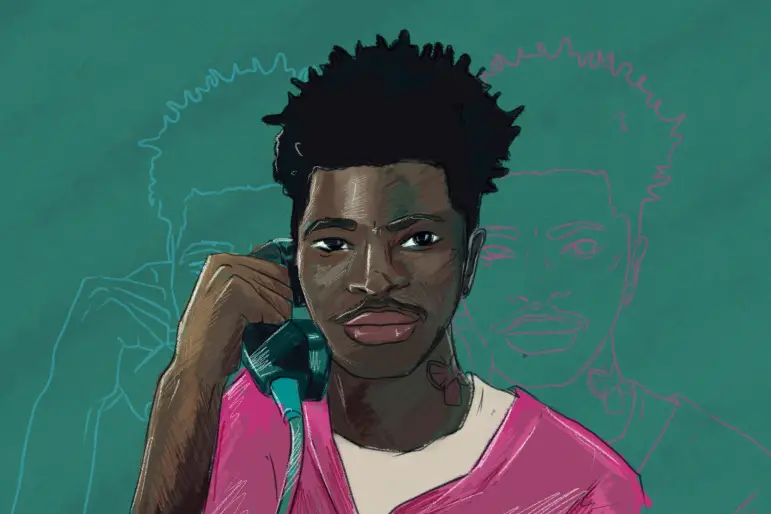Lil Nas X has delivered to the gays again with his most recent release, “Industry Baby.” The music video begins with Lil Nas X being sentenced to five years in the aptly named Montero State Prison for being gay. Three months later, Lil Nas X shows off a new set of grills, tattoos and a few inmates who give him lap dances in between cleaning the Grammys and plaques he has garnered from previous releases. He raps the lyrics, “You was never really rooting for me anyway” while performing a flamboyant choreography that finds him naked in the prison showers with other inmates. The video features up-and-coming rapper Jack Harlow as an inmate who helps Nas escape.
It says a lot that Lil Nas X chose to have men dance on him while the only woman in the video is hypersexualized by Harlow. The latter’s verse does nothing in terms of pushing the supposed “gay agenda” trolls constantly allege that Lil Nas X spreads; Harlow and Lil Nas X each openly express their own unique sexualities. The song was masterfully marketed and the video is boldly queer, showing us again how Lil Nas X is changing mainstream music for gay artists.
Queer people have always existed in every aspect of entertainment — they have just spent forever hiding themselves in their art. Coming out could end their careers or even lives. George Michael, Tracy Chapman, David Bowie, Freddie Mercury and Elton John are examples of successful queer artists who, for the majority of their careers, had to hide or mask their sexualities to maintain their success within the industry.
Growing up queer, I always looked for LGBTQ+ people in the media I consumed. Very seldom did I find overtly gay musicians. I knew that Lance Bass was gay, but he had to hide his identity, and Ricky Martin’s music career was basically over by the time he came out. Lady Gaga isn’t overtly sexually queer but her aesthetics resonated with queer people, especially after the release of her gay anthem, “Born This Way.” LGBTQ+ musicians who are out and express their queerness in their music (i.e. by using same-sex pronouns for love interests) are usually signed by smaller labels and can only produce music for a niche audience. Examples include Tegan and Sara, King Princess, Troye Sivan and “lesbian Jesus” Hayley Kiyoko, who have all had success in their own ways but are not considered mainstream artists.
Lil Nas X obviously isn’t the first queer artist to exist. He is, however, the first Black male artist in the hip-hop/rap genre to be so unapologetically and overtly gay. In comparison to Frank Ocean or Tyler, the Creator, who are both out of the closet but discuss their sexualities more subtly in their music, Lil Nas X is providing representation in ways we’ve never really seen in the industry before. The only comparison I can think of is Janelle Monae’s “Dirty Computer,” which delivers lesbians of color into a whirlwind of emotions and erotica. But despite being a known artist, Monae’s music isn’t mainstream, so her singles haven’t really seen the same levels of distribution as “Industry Baby.”
Lil Nas X has made it his mission to both be as unapologetically queer in his music as possible, and to also get radio airtime and various accolades. For the first time in my life, I am seeing an out-and-proud gay Black man manifest his visions without the potential repercussions to his career stopping him. He came out as gay and wants that message to be clear in his lyrics and music videos.
Lil Nas X is the perfect example of a pioneer of his generation (the kid is only 22!) with his ability to use social media to broadcast his growing brand. I don’t think I’ve ever witnessed an artist use controversy to advertise their next single so successfully. After all, whether it was planned or not, Janet Jackson’s career was horribly (and misogynistically) ruined after her boob was exposed during the Super Bowl for less than two seconds. Artists sometimes make bizarre choices when advertising their music (I still don’t understand Lady Gaga’s “Chromatica” Oreos), but Lil Nas X has shown how to do it right. It’s an understatement to say that his music video for “Montero (Call Me By Your Name)” came with massive controversy after he descended to hell, grinded on the devil and subsequently killed and became him.
However, the bigger controversy was sparked by a pair of shoes. Lil Nas X collaborated with company MSCHF to sell 666 pairs of limited-edition black Nikes refitted with red soles, satanic emblems and a drop of human blood. The shoes were a hit and all 666 pairs sold out in minutes. However, Nike was not so pleased with the publicity. The company filed suit against Lil Nas X and MSCHF and recalled the shoes. Not discouraged, he used this lawsuit as a lucrative launching point for his next single.
For roughly four months, Lil Nas X used his Twitter and TikTok accounts to amp up the court date for the Nike lawsuit, all while subtly setting up the theme of the “Industry Baby” video. He went to the lengths of changing his profile pictures to a mug shot and filming a Tyler Perry / Madea-style courtroom scene where he starred as the judge, defendant, prosecution and ultimately himself. In the video, he is sentenced to serve five years in a prison named after himself — another nod at internalized homophobia, which he sang about in a previous song, “Sun Goes Down.”
Almost everything Lil Nas X has done since coming out as gay has been in response to homophobic trolls. “Industry Baby” is a direct response to the haters who said he’d be a one-hit wonder, with lyrics like “I ain’t fall off, I just ain’t release my new s—.” It is also essentially a “thank you” to the fans who have stayed with him since “Old Town Road.”
The single’s success is a reminder that Lil Nas X still has so much more to show the world. “Industry Baby” debuted at No. 1 on Billboard’s Hot R&B / Hip-Hop Charts, and since its release has remained on Billboard’s Hot 100 and in the top 10 on Spotify’s global and U.S. charts. Lil Nas X has accumulated 50 million monthly listeners on Spotify for the second time in his career and is the platform’s third most-streamed rapper and 17th most-streamed artist overall. The success of “Industry Baby” has also helped Lil Nas X bring awareness to mass incarceration; he partnered with the Bail Project to create the Bail X Fund, which has raised $21,000 so far.

















